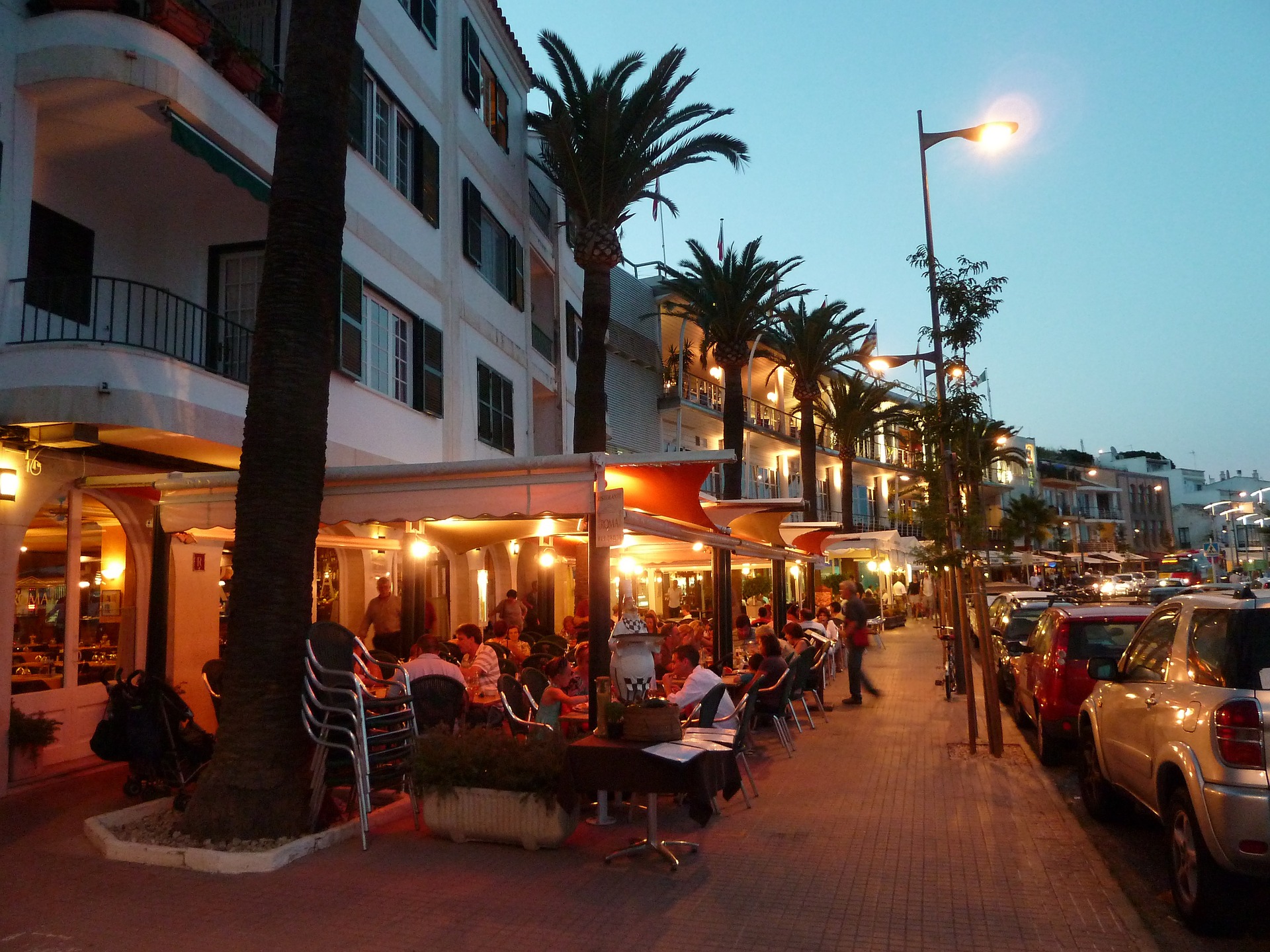Despite General Uncertainty, Spending in Croatia is 37% Higher Than Last Year
May 14, 2022 - In the last week of April, the spending in Croatia was 37% higher than last year, attributing this trend to the consequences of rising prices and the creation of stocks.
How is it possible that in a situation of general uncertainty caused by global geopolitical tensions, as well as the consequences of the pandemic, Croatia is facing the phenomenon of an explosion of fiscal accounts? Jutarnji List reports that data from the Tax Administration of the Ministry of Finance show that from April 25 to May 1 this year, compared to the same period in 2021, the number of fiscal accounts increased by a very high 24 percent, while the total fiscal accounts increased by 37 percent.
It is interesting that in the activity of providing accommodation and food preparation in the same compared week, the number of bills increased by an enormous 88 percent, while the number of bills was as high as 167 percent. Does this mean that Croatian citizens and tourists suddenly spend a lot more than they spent last year, or is it something else that should not be fueled by unjustified and potentially dangerous optimism?
Last year, when the inflationary trend began, Jutarnji List's analysis warned that the faster growth of the total amount of issued invoices in relation to the number of issued invoices probably indicates an acceleration of price growth.
Given that this year's theory seems to have proved correct, the fact that the number of accounts grew by 24 percent and the total amount spent on these accounts by 37 percent means that inflation has made a very significant contribution to the growth of fiscal accounts. However, the overall increase in the number of fiscal accounts of 24 percent is so large that we are certainly witnessing a very significant increase in spending.
As the real tourist season has not yet started, the growth in the number of fiscal accounts is most likely due to the robust growth of domestic demand. Why Croatian citizens choose to spend extravagantly at an uncertain moment in world history is difficult to assess without more detailed statistical insights into what exactly they paid, but it may be an attempt to spend before possible deeper problems begin. But it may also be simply a matter of swollen consumer confidence, regardless of all potential security and economic threats, writes Jutarnji List journalist Gojko Drljaca.
For more, check out our business section.
Croatian Workers: Has The "Great Resignation" Trend Reached Us?
February the 24th, 2022 - The Great Resignation, or as it is also often referred to, ''The Big Quit'', is a trend among employees who, in large numbers, leave their jobs voluntarily to find their places elsewhere under the sun. Is this affecting Croatian workers, too?
As Poslovni Dnevnik writes, this has been stated by the MojPosao/MyJob portal, which investigated whether this phenomenon had reached Croatian workers yet. The survey was conducted on 800 employees and 26 employers, who asked if they had thought more about stepping down in the last year than before the coronavirus pandemic which altered life as we knew it completely.
Poor interpersonal relationships are the main reason for saying goodbye among Croatian workers...
As many as half of the respondents (51%) who had a job in the last year in that period resigned and changed their work environment. Only every third person (36%) had a secured second job at the time of them leaving, while two thirds of respondents left a secure job without having a "Plan B" at all. In the same period, as many as 88% of surveyed employers said they noticed an increased rate of Croatian workers leaving under their own steam. Men (54%) appeared to be more likely to resign than women (49%).
In addition, Croatian workers with a university degree (51%) are more prone to leaving their employers than those with a higher (46%) and secondary (48%) education, and respondents with less years of work experience. Namely, as many as 84% of those with one year of work experience resigned in the last 12 months and only 18% of those with up to 10 years of work experience did the same.
They most often resigned because of bad interpersonal relationships, that is, because they felt that the company didn't appreciate them enough. In third place is too low a salary, followed by the bad impact of work on health and the impossibility of professional advancement, ie the acquisition of new knowledge and skills.
Job saturation and feelings of underestimation also have a role to play for Croatian workers...
On the other hand, employers are convinced that the main reason for the departure of their employees lies in low wages, feelings of underestimation/unappreciation and better offers from other employers (although this reason was stated by only 16% of Croatian workers).
Compared to the pre-pandemic period, employees were increasingly considering quitting due to feelings of underestimation/unappreciation and job saturation, while once the most important factors in deciding to leave a company such as receiving a better offer and low pay fell very much into the background. Women resigned to a slightly greater extent than men did citing poor interpersonal relationships, while men appear more likely to leave employers due to job saturation, large amounts of overtime and dissatisfaction with the company's management.
Observing the level of education, Croatian workers with a university degree leave more often because of burnout and poor management than those with higher and secondary education do. Although slightly more than half of the respondents (53%) stated that the pandemic didn't affect their decision to resign, a large number of people (47%) have just started thinking about a career change in the last two years, primarily due to the changed situation in companies (working conditions, interpersonal relationships, etc).
What does the future hold?
Half of the respondents (50%) intend to change jobs within the next year, and men (53%) are slightly more inclined to this decision than women (48%). One in two people think more about quitting now than they did two years ago (51%), a fifth (22%) do the same as before, while 27% of respondents today are less likely to juggle with that thought in these current circumstances.
Although in the past, Croatian workers typically didn't leave their employers solely due to dissatisfaction with their wages, most employees can be attracted by a new employer offering a higher income. In second place is the company's image (they would move to a company they believe is more caring for its employees), followed by a better financial benefits package, more flexible working hours, the chance to work from home, a better position within the company and a better non-financial benefits package.
The MojPosao portal concluded that The Great Resignation has not yet reached the proportions with Croatian workers as it has across the Atlantic in America, however, it is definitely visible that employees have begun to question their own values, the company's values and think more about what is better for them than they did just two years ago.
Poor interpersonal relationships, a company that doesn’t value employee efforts, low pay, and poor working conditions are what will drive Croatian workers to reconsider their employment relationships.
For more, check out our lifestyle section.
Unemployment in EU, Euro Area and Croatia Hit Record Low Since Start of Pandemic
ZAGREB, 10 Jan 2022 - The unemployment rate in the European Union (EU), the euro area, and Croatia in November dropped to its lowest level since March 2020 and the outbreak of the COVID-19 pandemic, according to a report by Eurostat released on Monday.
The European Union's unemployment rate, measured by the International Labour Organisation (ILO) methodology, in November, fell by 0.2 percentage points compared to the month before, to 6.5%.
In the euro area, it slid by 0.1 percentage point to 7.2%.
In both areas, the joblessness rate thus reached its lowest level since March 2020, when COVID-19 started spreading across the world.
According to Eurostat, there were 13.984 million unemployed persons in the EU in November 2021, including 11.829 million in the euro area.
Compared to October 2021, their number declined by 247,000 in the EU and by 222,000 in the euro area. Compared to November 2020, the number of unemployed persons decreased by 1.659 million in the EU and by 1.411 million in the euro area.
In November 2021, Spain and Greece were the only EU countries to record a double-digit unemployment rate, of 14.1% and 13.4% respectively.
Croatia's unemployment rate, measured by the ILO methodology, dropped to 7.1% from a revised 7.3% in October. An earlier estimate for October indicated an unemployment rate of 7%.
That is the lowest unemployment rate since the outbreak of coronavirus in March 2020, when it was 6.5%. In the February before the pandemic, it was 5.9%.
In November, Croatia thus ranked alongside Finland and Latvia, which had unemployment of 7.2% and 7.3% respectively.
There were 127,000 unemployed persons in Croatia in November, according to Eurostat, or 4,000 fewer than in October. Compared to November 2020, their number decreased by 26,000.
The lowest unemployment rate in November was registered by the Czech Republic, of 2.2%. It was followed by the Netherlands (2.7%), Poland (3%), and Germany (3.2%).
For more on politics, follow TCN's dedicated page.
Parl. Speaker: Pandemic's Darkness Affects a Part of Political Scene
ZAGREB, 12 Dec 2021 - Parliament Speaker Gordan Jandroković on Sunday participated in a ceremony of the delivery of Bethlehem Light of Peace to the Cathedral of Zagreb, and on that occasion said that the times were not easy and that the pandemic's darkness affected the society, including a part of the political scene.
Let this Light enlighten many souls, Jandroković said.
The Bethlehem Light of Peace is a symbol of Christmas and in the Bible, it symbolizes the coming of Jesus, whose birth promised peace to all people of goodwill.
In his address to the press, the Sabor Speaker called for vaccination and for compliance with all anti-epidemic rules and for responsible and rational behavior.
"One should take care of the lives and health of other people."
Asked by the press whether the Constitutional Court will be asked to test the constitutionality of the questions of the Bridge party's ongoing referendum initiative against COVID certificates before the necessary signatures were collected or after that, Jandroković said: "We live in a democracy, everybody can do everything that is allowed by law. However, I appeal to common sense, conscience, and to the awareness that not every topic promoted in that way could be beneficial to people. Quite contrary."
We have many people who have got sick and many who have died of the disease, and it should not have happened. Inoculation, adhering to epidemiological measures and prudence are the way to reduce coronavirus numbers, he said, underscoring that it is crucial to encourage people to get vaccinated.
Asked by the press about the indictment against former minister Lovro Kuščević and reports on a preliminary investigation against former minister Tomislav Tolušić over alleged white-collar crimes, the parliament speaker said that it was inappropriate for politicians to comment on prosecutions, although it seemed that there was a widespread belief that politicians must take stand on each topic.
In a democracy there is the separation of powers, everybody is responsible for their job and prosecutorial authorities are expected to explain to the public things unclear from their remit, said Jandroković, adding that keeping making comments on investigations can amount to pressure on the judiciary.
For more, check out our dedicated politics section.
Minister Says Croatia at Peak of 4th Wave of Pandemic
ZAGREB, 6 Nov 2021 - Health Minister Vili Beroš told the national radio (HR) on Saturday morning that over 7,000 new cases of the infection with coronavirus had been registered in the last 24 hours.
Croatia is now at the peak of the new wave of the pandemic and unfortunately, today we have registered over 7,000 new cases.
The minister declined to predict the scenarios for the future.
Let us do our best, and the best thing is to get vaccinated and comply with the basic anti-epidemic measures, said Beroš.
He said that the hospitals were not under strain such was the case in the previous waves of the COVID-19 pandemic.
He called for responsible behavior of all so as to prevent an excessive burden on the healthcare system.
Vaccination reduces possible reservoirs for the virus, he said, reiterating the benefits of immunization such as fewer chances of getting seriously ill.
For all you need to know about coronavirus specific to Croatia, make sure to bookmark our dedicated COVID-19 section and select your preferred language.
Croatia Registers 184 New COVID Cases, 7 Deaths
ZAGREB, 10 June 2021 - In the past 24 hours, Croatia has registered 184 new COVID cases while seven people have died, the national COVID-19 response team said on Thursday.
There are currently 1,290 active cases in the country, including 482 hospitalized patients, 48 of whom are on ventilators.
A total of 358,245 cases of coronavirus have been registered since the outbreak of the disease in February 2020 and 8,110 people have died. A total of 348,845 people have recovered, with 217 of them recovering in the past 24 hours.
Currently, 6,865 people are in self-isolation.
To date, a total of 2,065,437 people have been tested for the virus, including 5,435 in the past 24 hours.
By 9 June a total of 1,986,929 doses of vaccines were administered. So far 1,370,306 people have received at least one dose while 616,623 have received both shots.
For all, you need to know about coronavirus specific to Croatia, including travel, border, and quarantine rules, as well as the locations of testing centers and vaccination points across the country, make sure to bookmark our dedicated COVID-19 section and choose your preferred language.
Croatia Registers 375 New Coronavirus Cases, 10 COVID-Related Deaths
ZAGREB, 27 May 2021 - Croatia has registered 375 new cases of coronavirus infection and ten more infected people have died in the past 24 hours, the national COVID response team said on Thursday.
There are currently 2,968 active cases in the country and 968 hospitalized patients with 95 of them on ventilators.
To date, a total of 1,994,545 people have been tested for the contagion, with 6,319 tests conducted in the past 24 hours and the share of the positive tests being 6%.
As of Thursday, 1,645,332 doses of vaccines have been administered. To date, 1,221,109 people have received at least one dose of a vaccine while 424,223 have received both shots.
Since 25 February when the first coronavirus case was detected in Croatia, to date, there have been 355,296 registered cases and 7,981 people have died as a consequence.
A total of 344,347 people have recovered of whom 509 in the past 24 hours.
There are currently 12,259 people in self-isolation.
For all you need to know about coronavirus specific to Croatia, including travel, border, and quarantine rules, as well as the locations of vaccination points and test centers up and down the country, make sure to bookmark our dedicated COVID-19 section and select your preferred language.
PM Says Government Has Done Utmost to Protect People's Health
ZAGREB, 25 February, 2021 - Recapping the year-long fight against COVID-19, Prime Minister Andrej Plenković said on Thursday the government had taken appropriate measures and done its best to protect people's health, thanking people for behaving responsibly and understanding a situation no one could have predicted.
The first coronavirus case in Croatia was registered a year ago today. Speaking at a cabinet meeting, Plenković said that from day one the necessary protective equipment had been provided and the continuation of education and activities in culture and the arts taken into account.
The economy has been taken into account the entire time, he said. "Job-retention measures have been very abundant. We never thought we would give so much money to retain jobs in the private sector, to workers, employers."
Pensions have been paid as well and the number of the jobless has been as before the pandemic, Plenković said.
"And we have done all that while ensuring financial stability in such a way that Croatia is keeping its investment credit rating and stepping through the European Exchange Rate Mechanism towards the euro area... We have concluded good financial arrangements both with the HNB (Croatian National Bank) and the European Central Bank, with Croatian banks and pension funds, with all stakeholders who have made it possible for everything to function."
Plenković regretted that certain activities had been restricted. "That's not something we are doing because we want to, it's what all governments are doing, all countries around the world, to protect people's health."
Vaccine distribution needs to be stepped up
Plenković said he would push for stepping up the distribution of COVID-19 vaccines at EU level which, he added, the European Council would discuss today, in order to vaccinate as many people as soon as possible, notably those most vulnerable.
"I'm confident the announcement of 700,000 doses in total by the end of March will be a strong barrier against the spread of the epidemic, and we expect even larger quantities. Our message today will also go to the EMA (European Medicines Agency) to approve vaccines more quickly, first and foremost Johnson&Johnson's, which is under way and which we have ordered in 900,000 doses."
Plenković said the government had reserved the vaccines on time, even more than necessary in order to vaccinate everyone over 18 years of age, with 6.8 million doses ordered to date. "We will continue to make an effort, the responsibility is big."
He extended his condolences to the families of the 5,500 Croatian citizens who have died "of COVID or with COVID."
"Those are great losses. We sympathise with their families. We regret it very much. And I thank all fellow citizens for behaving responsibly and understanding the context which has been going on for a year and which no one could have planned for."
Index: Cafe Terraces Open In Two Weeks If Numbers Stay Low
February 17, 2021 – Indoor sports return and cafe terraces open on Monday 1st March if infection numbers remain low, learns Croatian media outlet Index.
By the time spring arrives, Croatian coffee lovers should be back enjoying their drinks outside their favourite cafe bar. Cafe terraces open on Monday 1st March 2021 if Coronavirus infection numbers remain low and stay on their current trajectory, according to Croatia media outlet Index.
Indoor sports will also return on the same date, with the same stipulation that infection numbers remain low. Having cafe terraces open again cannot come too soon for frustrated business owners. At the moment, they are only permitted to serve coffee to go. According to Index, from on Monday 1st March 2021, cafe terraces open and people will no longer need to congregate on the street outside, in parks or on benches to enjoy their drinks.
“Measures should be further relaxed throughout Croatia as of March 1, including the much-anticipated opening of cafe terraces,” says the portal. Cafe terraces open and other relaxed measures depend on the prerequisite of figures remaining at the level they are at now. “The share of newly infected in the number tested in recent days is below five percent,” Index adds.
Headquarters and the government had already announced that the next round of concessions could be expected in early March. Cafe terraces open in Croatia from March 1st 2021, if Coronavirus numbers remain low, say media outlet Index
Cafe terraces open in Croatia from March 1st 2021, if Coronavirus numbers remain low, say media outlet Index
Croatian cafe terraces open, the interior of cafes and restaurants remain closed
“As we find out, the terraces of cafes and restaurants will definitely open on March 1,” wrote Index. “However, according to information from a source close to the Headquarters, the closed (interior) parts of cafes and restaurants will not be opened. (This) is realistically expected in April at the earliest.”
“Once cafe terraces open, guests will most likely not be able to enter the interiors of cafes and restaurants, except perhaps for the use of toilets, to prevent indoor parts of cafes and restaurants from being used and guests being served there. Closed spaces are still considered by headquarters (to be) an extremely high risk when it comes to the spread of coronavirus.”
Further relaxation of Coronavirus measures: Indoor sports to return
According to Index, although the first information received said that from March 1, only indoor sports for children would be opened, the portal has discovered that instead all indoor sports should be opened, with prescribed epidemiological measures. They remind that, according to current measures, only gyms, swimming pools and contactless individual ball sports are allowed.
Public gatherings / marketplaces / fairs
“There should be concessions when it comes to fairs, but it is not yet completely clear under what conditions,” says the portal. Like supermarkets, open-air and indoor markets are currently permitted to operate. The newly relaxed measures will pertain to similar, but more irregular events at which arts & crafts, books and other goods are on display for sale. The portal say that the vending and consumption of food – which is traditional at such events – will likely not be permitted for now.
“The headquarters is inclined to open fairs where products are sold or exhibited, but the consumption of food and drinks might be limited to prevent excessive gatherings and socializing,” they say.
Relaxation of Coronavirus measures pertaining to private gatherings
“The allowed number of people at various gatherings should not change significantly, only minor corrections are possible,” claims the portal, adding that the current ban on the gathering of people from more than two households may instead be downgraded to a recommendation. The portal reminds that this measure has not been strictly enforced in any way before.
"To give way on March 1, the numbers have to stay at about the level they are now. But the pressure is great - no one wants to keep something closed that should not be kept closed. Most of it is already open, so there remains a narrow circle of what can still be given,” a source close to the Headquarters is quoted as telling Index.
Friction between regional and national authorities over easing of Covid-19 measures
Even if cafe terrace open on March 1st, Index concludes their article by reminding that a disparity between regional and national authorities is still causing some friction. The friction between two north-westerly regions of the country and national headquarters is specifically addressed.
“The Headquarters believes that the announcement of the Istrian Headquarters that they will open the terraces of cafes and restaurants on March 1 was very incorrect. They (national headquarters) say that this opening is planned at the level of the whole of Croatia anyway.”
“However, the decision of the Primorje-Gorski Kotar headquarters, which postponed the opening of bookmakers and casinos in that county, is perhaps even more critically commented on. The government states that the opening of bookmakers (betting shops) and casinos is a purely financial decision and ironically comments that if the Primorje-Gorski Kotar County wants to leave these facilities closed, they should (themselves) cover the costs that will be incurred,” says the Index article.
Index claims that these moves from Istria and Rijeka (Primorje-Gorski Kotar) are regarded in the National Headquarters and the government as politicking and that they are connected with the upcoming local elections.
For the latest travel info, bookmark our main travel info article, which is updated daily.
Read the Croatian Travel Update in your language - now available in 24 languages
Jutarnji List: Croatian Cafes Open on Monday 15 February (and Gyms too)?
February 2, 2021 – The wait is over! In less than two weeks, Croatian cafes and gyms will open, if infection numbers continue on their current downward trajectory
With the spring season just around the corner, people will soon be able to once again enjoy coffee on the sun-filled daytime terraces of Croatian cafes. If Coronavirus infection numbers continue on their current downward trajectory, Croatian cafes and gyms will open on Monday 15 February. All businesses will still have to operate under strict epidemiological measures.
Deputy Prime Minister and the Chief of Staff, Davor Božinović, spoke about the forthcoming concessions on Croatian cafes and gyms, but a fuller picture of how the concessions will actually look was discovered unofficially by Croatian daily Jutarnji List. It was published in the evening of Monday 1st February 2021. The good news soon travelled across Croatia. It will come as a great relief to many independent business owners who have not been allowed to operate.
Business owners have been increasingly on edge over recent weeks, with protest openings of Croatian cafes and gyms threatened to take place in defiance of the current ban on operations (indeed, some did). Owners of Croatian cafes were particularly irked by the seeming inconsistencies in current measures – fast food outlets, gas service stations and bakeries were all permitted to sell coffee to go. People took advantage of this and thereafter congregated on the streets outside such businesses to enjoy their drinks. But, Croatian cafes were still not permitted to service people wishing to drink on outside terraces in almost exactly the same manner.
Monday 15 February has long been announced as the next review date for the imposed Coronavirus measures. But, until now, nobody was certain in which way – if any – measures would be relaxed.
Under unofficial plans, from Monday 15 February Croatian cafes will be able to serve coffee and drinks to be consumed on outside terraces, with strict epidemiological guidelines in place.
Croatian cafes and gyms opening on 15 February will be conditional on a continued downturn in infection numbers and the absence of new Coronavirus strains appearing in Croatia
The re-opening of Croatian cafes and gyms is wholly dependent not only on the continuing downturn in numbers of infected but also on the condition that new strains of Coronavirus - specifically those first detected in the UK and South Africa - do not appear in Croatia between now and then.
"If the indicators are good, if the numbers go down, we will certainly not be reluctant to react,” Deputy Prime Minister Davor Božinović said, regarding the 15 February review, “our aim to strike a balance between everything - with an emphasis on health care - has brought us to a position where Croatia has the least stringent measures in the EU."
Coronavirus infection numbers in some other European territories remain at an alarmingly high rate, although a corresponding relaxation in measures for some regions of Italy was similarly announced over recent days. This is the second time since the start of the pandemic that stricter measures imposed by the Croatian government – and a widespread public observance of these measures and other guidelines - have successfully produced the intended results.


